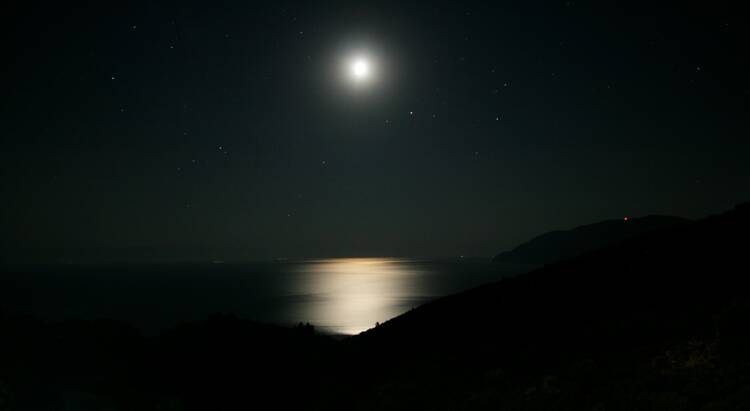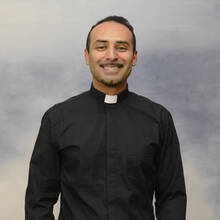Moonlight and other sources of cosmic weight
Salvador Dalí painted perhaps the most iconic depiction of the crucifixion in the last century called Christ of Saint John of the Cross. Its inspiration is said to come out of a dream of the surrealist artist. Dalí portrays a cosmic Christ whose unbloody crucifixion appears to hold the center of the universe together while the earth below is washed with warm colors, calm waters and an empty fisherman’s boat. The work of art is both haunting and comforting at the same time, and this sentiment holds true for the “end times” readings of this Sunday.
“Heaven and earth will pass away, but my words will not pass away” (Mk 13:31).
When was the last time you lived through a hard moment of crisis?
Where did you find a source of hope through this difficulty?
How will you return the favor to someone else?
One comforting effect of Dali’s work is how the painting gives off a soft moonlight that emanates from Christ. The image necessitates both darkness and light-source in order to provide its dramatic sense of comfort. This Sunday’s apocalyptic readings provide that same imagery as the absence of light creates a tension to anticipate the one “coming in the clouds” who will fill that void. Without mentioning any name directly, the Gospel also warns against placing false hope into a mistaken source of light.
In this Sunday’s Gospel, the dimming of cosmic lights provides an opportunity to read the signs of the times. “The sun will be darkened, and the moon will not give its light, and the stars will be falling from the sky, and the powers in the heavens will be shaken” (Mk 13:24-25). When there are celestial lights to guide a sojourner through the night, the darkness is bearable. If these begin to dim, it sounds an alarm and warns a people of faith to become vigilant.
This Sunday’s first reading also offers a warning about shadowed times. “It shall be a time unsurpassed in distress,” says the author, “since nations began until that time” (Dn 12:1). This sort of apocalyptic writing depicts episodes of devastating crisis, like sacrilege in the most holy temple of Jerusalem by the Romans. The same passage closes, nonetheless, with words of immense comfort: “But those who lead many to justice shall be like the stars forever” (Dn 12:3).
Who are the just ones that will shine like guiding stars in the night? In 20 BCE, Herod the Great began to build a new temple in Jerusalem on a scale that would be difficult to replicate today even with modern technologies. Herod’s temple was larger than any place of worship in Jerusalem before or after it. It lasted only a short time before the Romans burned it to the ground in 70 CE. Addressing the transience of earthly things, Jesus states, “Heaven and earth will pass away, but my words will not pass away” (Mk 13:31). False lights, like Herod the Great, distract from the source of true guides.
In the surreal images of apocalyptic writing the world can appear like a menacing night, meanwhile the stars shine brightly to guide and point out a potential direction. In the actions of those who lead others to justice, one can look for the guides that point to our one hope in the cosmic Christ. “The wise shall shine brightly,” writes Daniel, “like the splendor of the firmament” (Dn 12:3). Look to the sky where the moonlight, stars and the sun remind us that we are not alone. Think of Dalí, the cosmic Christ as the center of the universe holding everything and everyone together in that hope. Even as we seek the light, may we also become a conduit that relays even the faintest light of hope to another.








